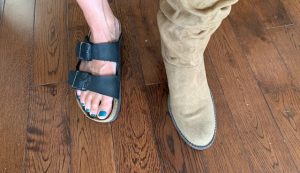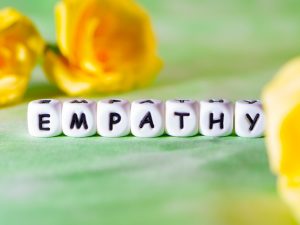Empathy
What is empathy? Why is empathy important?
According to the definition on Google- ‘The ability to understand and share feelings of another.’
Putting ourselves in their ‘shoes’. It takes curiosity.

Empathy helps us understand why people behave a certain way. It also helps to understand the impact of feelings and why we may react like we do. More than that, it helps to be curious about patterns of behavior, how we react, and how we respond.
The ability to put yourself in someone else’s situation in order to understand their feelings and experiences at that moment. This is empathy. And we do can learn to be empathetic.
From my perspective along with empathy, I think self-awareness is also part of being empathetic. Without self-awareness and understanding of how you work and how you interpret different life events, people or situations, it would be difficult, if not impossible, to be empathetic. Self-awareness is part of understanding. To be empathetic you need to have compassion for others as well as curiosity.
There is a difference between rescuing, enabling someone and being empathetic. Rescuing and enabling do not help the person who is dealing with a difficult situation or emotion. Even the language is different. A rescuer will tell the person what to do, lots of ‘shoulds’, and how to feel. Often the person feels more shame and blames than empathy and support.
Quite often we tend to rush to judgment and want to make comments, to solve all their troubles and offer solutions. But both are neither helpful nor wanted. Empathy‘s voice on the other hand has more encouraging understanding words. There is no ‘should feel or should do’. An empathetic voice will ask the person ‘how are you feeling?’, ‘what do you think about the situation?’ and ‘what are you going to do?’.
Empathy requires us to let go of our egos, to keep our stories out of the conversation so we can focus on the person. It requires us to be aware of our own triggers and traumas when we are having a difficult conversation.
Empathy is a two-way street,
in which we can understand and share the experiences and situations of another person and not take on the stress and strain and trauma to ourselves. This takes practice, this takes self-awareness, self-compassion, and self-care tools and strategies.
Here is a personal example of where empathy for another required empathy for myself while dealing with a client who is struggling with an unhealthy breakup from an abusive partner: during the conversation, I suddenly experienced some emotional triggers and recognized my own trauma interrupting my thought process as I was trying to be empathetic and understand her fears and concerns. Without that self-awareness, tools and strategies on how to refocus I may not have been able to give her the support and empathy, she needed to find her way, and make her own decisions in moving forward.
Empathy is the ability to recognize, understand, and share the thoughts and feelings of another person, animal, or fictional character. Developing empathy is crucial for establishing relationships and behaving compassionately. It involves experiencing another person’s point of view, rather than just one’s own, and enables prosocial or helping behaviors that come from within, rather than being forced.
Some surveys indicate that empathy is on the decline in the United States and elsewhere, findings that motivate parents, schools, and communities to support programs that help people of all ages enhance and maintain their ability to walk in each other’s shoes.
Let’s face it, none of us is perfect.
We need to be empathetic and it takes practice and awareness. Sometimes the most helpful words we can give to someone sound like ‘I’m so sorry this is happening to you’ or ‘I’m so sorry you have to go through this’.
We are not taking on their trauma. We are not taking on the work that they need to do in order to accept and move forward in life. Empathy is like walking beside someone with an open heart, ears, and mind, free of judgments.
I think it’s very important that people teach empathy at a very early age. Let’s face it, not everyone grows up in a home where they are loving, supportive and effective communicators as parents or caregivers. But that doesn’t mean we have to repeat the same abusive behaviors. Empathy can be learned, and it can be re-learned after trauma as we learn the right tools and strategies for our own self-care and mental health.
After surviving 20 years of workplace bullying as a female RCMP officer, I had a choice to remain in the negativity, pain and trauma or find a way to thrive and move forward with empathy for those who abused me but also for those who are dealing with the same situation today.

Those negative experiences have given me tremendous empathy for others as they navigate through workplace bullying, harassment and other violence. Empathy has helped the people I deal with, every day. With a sense of curiosity about what’s happening to them and the reactions I may experience.
Yes, of course I make mistakes and become confused between empathy and rescuing. This is where self-awareness is important. We can pivot off that rescuing path and get back onto the empathy sidewalk. I call it a sidewalk because when we are helping someone, being empathetic, we are not driving them or pushing them forward we are standing beside them, along the sidewalk as they navigate their own road. That is empowering.
Life is about understanding ourselves and understanding others with empathy and awareness. Remember it’s never too late to re-learn healthier patterns of thinking and behaving.
Empathy is an important part of understanding yourself and others.
